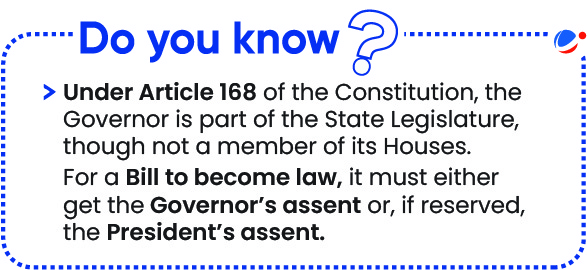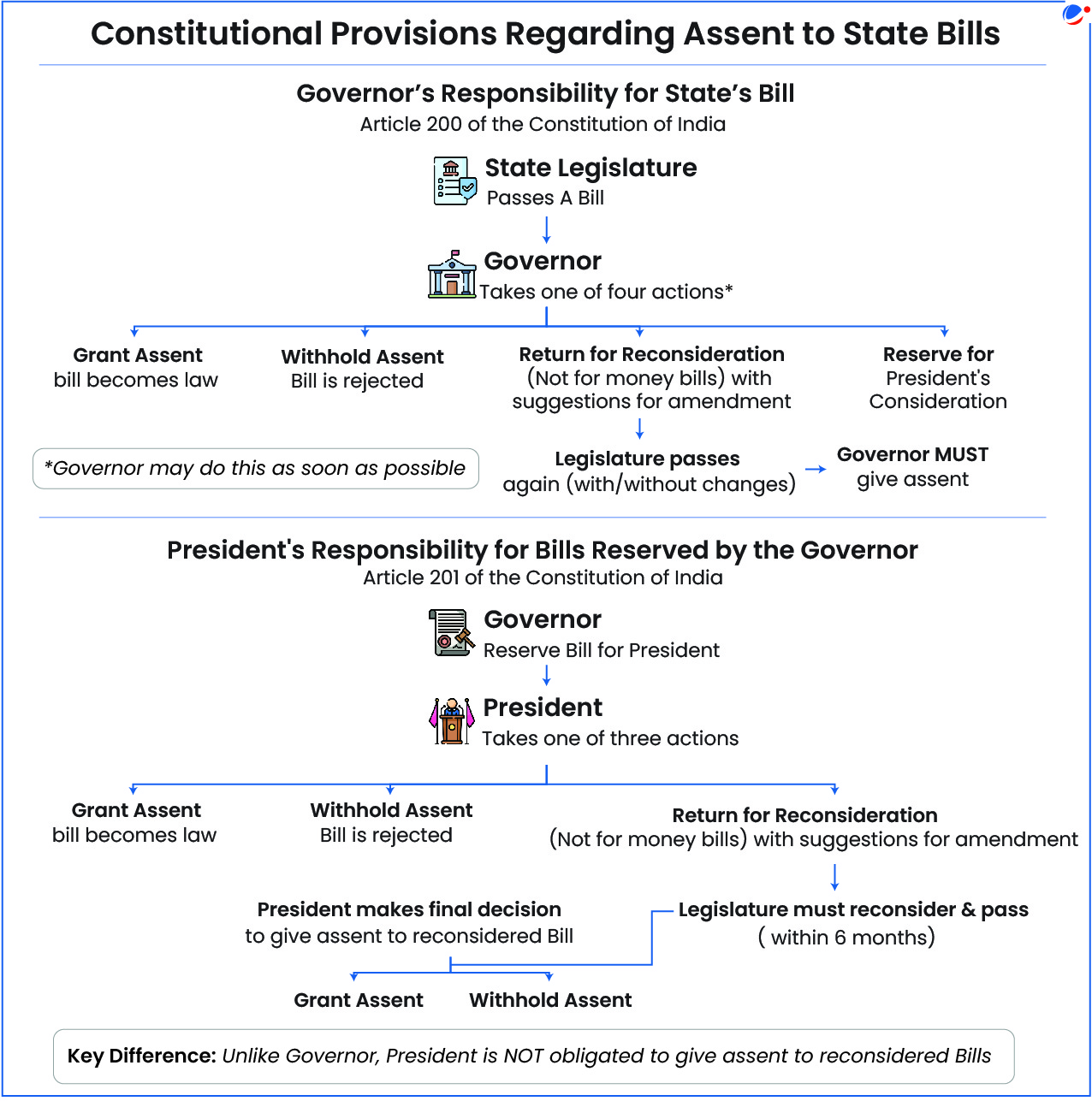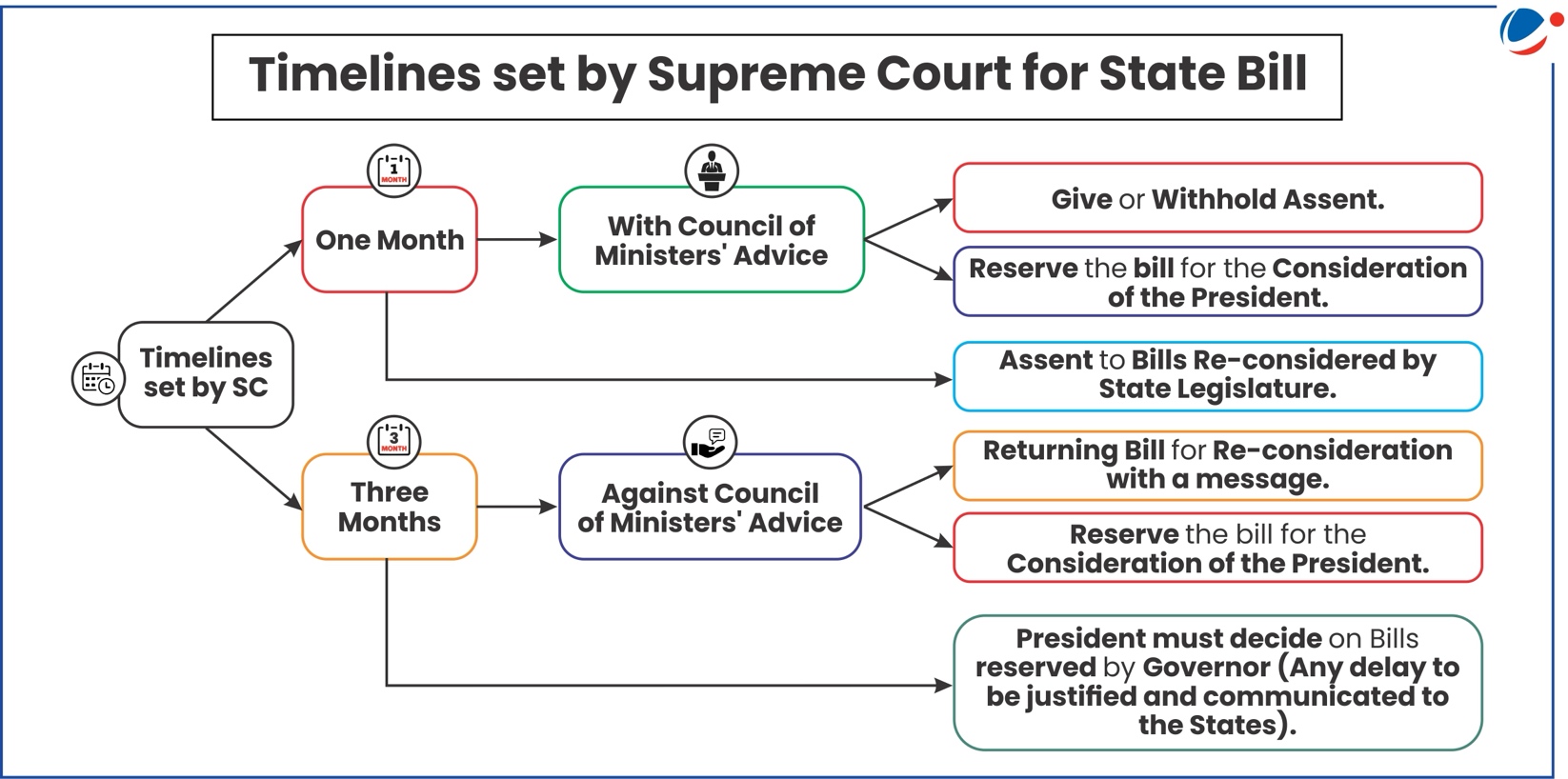Why in the News?

Recently, the Supreme Court (SC) in the State of Tamil Nadu v. The Governor of Tamil Nadu issued directions to ensure the timely approval of Bills passed by the State Legislature.
More on the News
- Background: Between November 2020 and April 2023, the state legislature passed 13 bills.
- Of these, 10 were either withheld or sent back to the Assembly by the Governor without any communication.
- When the Assembly re-passed them without any material changes, the Governor reserved them for the President instead of giving assent.
- In response, the Tamil Nadu government filed a writ petition challenging the Governor's prolonged inaction on important bills.
- Court held that the Governor's inaction, reserving the Bills after re-passage, was legally invalid. Therefore, the President's actions on those Bills were also declared null and void.
- Of these, 10 were either withheld or sent back to the Assembly by the Governor without any communication.
- Court used power under Article 142 of the Constitution: The Supreme Court exercise its inherent powers under Article 142 of the Constitution, which empowers the SC to pass a decree/order necessary for doing complete justice.

Key Highlights of the Judgement
- Inaction is unconstitutional: Despite there being no prescribed time limit, there is no Pocket or Absolute Veto available to the governor or President (under Article 200 or 201, respectively).
- In case the Governor/President exhibits inaction, the State Government could seek a writ of mandamus from a competent court.
- A writ of mandamus is an order from a court to a government official to properly fulfill their official duties or correct an abuse of discretion.
- In case the Governor/President exhibits inaction, the State Government could seek a writ of mandamus from a competent court.
- Governor can't reserve a re-enacted Bill for President's Assent: The Bill can be reserved for the President's assent in the first instance itself.
- If a Governor decides to withhold assent for the Bill, then he must mandatorily send it back to the State Assembly.
- When the Assembly re-enacts the Bill, the Governor cannot reserve it for the President.
- The only exception to this general rule is when the bill presented in the second round is materially different from the one presented to the Governor in the first instance.
- Prescribed timeline for assent of Bills: These time limits are not amendments to the Constitution, but judicial standards to ensure timely action and avoid arbitrariness. The Court introduced time limits to prevent misuse of powers.

- Governor Lacks Absolute Discretion Under Article 200: Article 163 (1) provides for the Council of Ministers to aid and advise the Governor, except in situations where the Governor is constitutionally required to act on his/her discretion.
- Under Article 200, the Governor does not possess any discretion in the exercise of his functions and has to mandatorily abide by the advice tendered by the Council of Ministers except in following situations:
- Second proviso to Article 200 (i.e., State Bills that would derogate the powers of the High Court must be reserved for the President).
- State Bills which will not become effective without assent of President
- Bills imposing taxes on water or electricity in certain cases (Article 288).
- Money Bills, or Financial Bills passed by State legislature to which special provisions of Article 207 apply during a Financial Emergency (Article 360).
- Bill relating to a subject enumerated in the Concurrent List: If the Bill is inconsistent with the Union Law, or an existing law with respect to that matter [Article 254(2)].
- Bill relating to Restrictions on Interstate trade, commerce and intercourse: Legislation imposing restrictions on trade and commerce requiring Presidential sanction (Article 304(b) read with Article 255)
- State Bills which require assent of the President to secure immunity from Articles 14 and 19: For Bills falling under
- Article 31A (providing for acquisition of estates, etc.)
- Article 31C (giving effect to certain directive principles).
- Where the bill is of a nature that if allowed to take effect then it would undermine the Constitution
- Under Article 200, the Governor does not possess any discretion in the exercise of his functions and has to mandatorily abide by the advice tendered by the Council of Ministers except in following situations:
- Discretionary power under Article 200 is subject to judicial review: Grant of assent by the Governor or the President (usually taken upon the advice of the Council of Ministers) may not be justiciable.
- However, withholding assent or reserving a Bill using the Governor's discretion can be challenged in court, as this discretion is limited by the Constitution.
- If the Governor acts against the advice of the State Council and reserves a Bill for the President, the State Government can challenge it in the High Court or the Supreme Court.
- If the President then withholds assent, that action can also be challenged in the Supreme Court.
- However, withholding assent or reserving a Bill using the Governor's discretion can be challenged in court, as this discretion is limited by the Constitution.
- President should consult the Supreme Court on Bills reserved for unconstitutionality: If a Governor reserves a Bill for the President's assent due to concerns of unconstitutionality:
- The President should seek the Supreme Court's opinion under Article 143 (President's power to seek advisory opinions from the Supreme Court on questions of law or fact).
- The President may disagree with the Court's opinion only for valid policy reasons and must provide clear justification for doing so.
- Such Consultation is important as:
- Governors cannot refer such matters to courts.
- The Supreme Court is the final authority on interpreting the Constitution and laws.
- The Court's opinion under Article 143 holds strong persuasive value and should generally be followed by both Parliament and the President.
- The President should seek the Supreme Court's opinion under Article 143 (President's power to seek advisory opinions from the Supreme Court on questions of law or fact).





